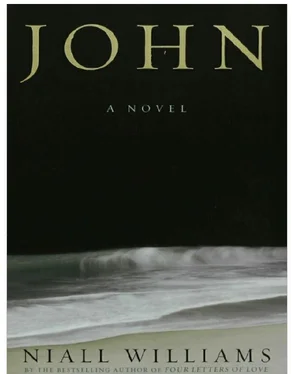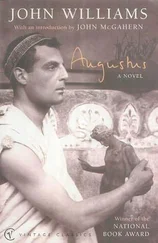Where four streets meet in a cross they stop; Lemuel indicates their various directions as he has been told. They are to one another more than company. They are part of one another's belonging and purpose and have not been separate. In the street-cross bright daylight beholds them, their wordless pause, their look from one to another, then embrace, then departure.
Emissaries, urgent and grave, they go into the shadows.
The day rises overhead. Man is announced in noise, from inside dwellings a discord of pots, jugs, clanging of metal, movement of wooden stools, tables, voices. Questions called, curses shouted. Into the streets come hastening traders, merchants minor, figures in varied dress, elbowing, inquisitive of all that might betoken business. Some with jewelled fingers, others in robes fringed with dust. They have their places to be; they know the best junctures, in what corners accumulate the most likely buyers. The city is theirs. A stranger is a purse yet unopened. The passageways are soon crowded. Ordinary clamour of humanity sounds, news of cousins, of sickness, of deals struck, fortune found. In the jostle of men, dogs moving. Men of generous proportion and slender spirit kick at them. With olive breath, spice breath, lemon fingers, honey-water wash, they exchange tales of outrageous boastfulness, how their acumen won riches, how the goddess shone down upon them, sent fools with deep pockets, how a mere two golden tokens in offering brought untold recompense. Ephesus is their city, a place blessed, where in return for sacrifice, the gods repay tenfold. In the traders there is this confidence, a practice of commerce they understand, that in the exchange between heavens and earth a tabulated costing exists. It is so: such an action brings such a response. For them, it is only to recognise the beneficence, to see what Artemis has sent them up the river or unloaded on the dock. So the early morning is beaten with haste and anticipation.
The sun burns. It seems to near, to descend, and make rise from below scents warm. Flies find the day come and take to the air. All species of gnat, spider, biting insect, traverse shadow and light in first quest of flesh.
Where Papias and Kester go some such hang in the air, a gauze drapery that falls across their faces. They are swiftly stung, the tiny black creatures virulent. Papias cries out, swats, slaps his forehead, his cheeks. He shuts his eyes where they swarm upon them. He fists into them; when at last the creatures are gone, he blinks into the light and realises that Kester is gone. The street pushes past him. He goes quickly back some way, then returns, hurries into another. He looks in doorways, scans the morning crowds. Panic races his heart, makes sing the bites in his cheeks, the wounded ear. Where is he? Where is he gone? Has he been taken? You were to watch over him; he was placed in your care. How can you have lost him? Accusation bubbles in his blood. His back itches wildly. He stands against a wall of rough stone. Beneath his robe the scabbed rash that runs from his left shoulder toward his spine is blossomed purple and craves his nails. Anything sharp will do. The ruined skin is inflamed and must be scratched to bleed. Papias could rub his back then against the wall. He could find relief so. But he doesn't. What pestilence is in him, what makes his skin rupture and blisters to weep, he fears, but he cannot drive it away. His itching is more furious than any; upon his skin, within his skin something crawls. But he will not scratch. Instead, he stands in near the wall, shaking. The craving worsens. Tightly he screws his hands to fists. He will outwait it; it will lessen. He shuts his eyes to make his mind see only the Lord. To see the face and the suffering. His lips move in prayer.
Let it pass, let it pass. If it be thy will, O Lord.
He prays not for healing, only a salve. The healing will come from the soul outwards and is not yet. He knows.
Across his back crawls the creature of his own unworthiness. Strike at me, it seems to say. Strike, scratch, draw nails across me. It is a wild torment. Papias knows he cannot defeat it, that if it scratches it will worsen.
Near the wall, he stands.
Traffic of traders passes, but not Kester. The boy is gone.
An old woman, kerchiefed, with hollow eyes and shadow moustache, watches. This man may be in the throes of bliss, may be an interlocutor, may against the wall be in receipt of an ecstasy divine. In Ephesus she has heard of such. The city draws them. The sacred and its mysteries are the local speciality. She gums sour spittle, watches. The man is white-faced, young, thin as all that have forgotten the body. Will he fall down in writhing as she has heard some do? Will he cry out in tongues? In Ephesus it would be no surprise. She has heard of such displays to bring followers. The outlandish, the extravagant, are the mark of theists now, such practice and manner as the Romans despise. The man barely moves. Sunlight comes down the wall to meet his head. His eyes are shut and his head tilted upward. Might it catch fire now? Might the gods let it burst in flame?
The woman watches. A cat comes to her feet. She loses the man a moment in the laboured passage of a laden cart. When she looks again, he is looking at her. He is righted. Has something happened? What is different? Has she missed the God moment? She kicks at the cat and to escape the man's eyes turns quickly inside.
The fury gone, Papias breathes. But where is Kester? Why has he run off? Did he not understand that they welcomed him? Did he not feel Christian love? Papias can find no comfortable answer. He steps out of the sunlight and continues to the end of the street. A figure of youth and curious intensity, he crosses the city and comes to visit the house of Diotrophes.
There are several buildings, all proportioned in style of wealth. The principal is a large dwelling with white portico, even placement of cypress trees on either side. The sun is hot; Papias will be glad of shade. At the entranceway he is readying what he will say when the door is opened. Before him is a man his own age with flaxen hair and eyes of palest blue.
'I am Papias, disciple of John, come to greet Diotrophes in the name of our Lord Jesus the Christ.'
The man says nothing. He looks at the stranger then turns and leads down a corridor to an anteroom. He raises a hand to indicate Papias should wait, and then is gone.
Here is the beginning, Papias thinks. Here is the first true beginning, the commencement of the gathering of the community. Diotrophes will have followers, he will know of others who have kept the faith and bring them the good news of our coming. They will join with us. How many? Maybe as many as three score. Maybe a hundred. And with those whom the others go to tell, by nightfall we may be a community of. .
He has not time to calculate the number, for the attendant is returned and gestures him to follow. The room he enters is long and clouded with the burning of frankincense. In its centre standing is a large circle of silver, an empty O. At the top of the room is a raised dais upon which sits a chair of ornate carving. Here sits Diotrophes, a man of sixty years with grey beard and deep eyes pursed in wrinkles. He wears a robe of dark blue and a chain of gold.
Papias goes forward and greets him.
'I am Papias, disciple of John, who is come out of exile on the island of Patmos to bring the good news.'
Diotrophes sits impassive.
'John, son of Zebedee,' Papias says a little louder. The frankincense is stifling. 'John who was the beloved disciple of our Lord Jesus the Christ, who was from the beginning and at the end, who sat at the right hand of our Lord, who. .' He has to pause for better breath. The air is so thick and sweet.
'We are come to bring the good news. I am to tell you that we rejoice in that you have kept the true faith and the time is now upon us for the coming of the glory.' His lips are dry. Is he not being clear? Is he failing to show the miracle of what is happening? 'It is a great time,' he says. 'We are full of joy.'
Читать дальше










